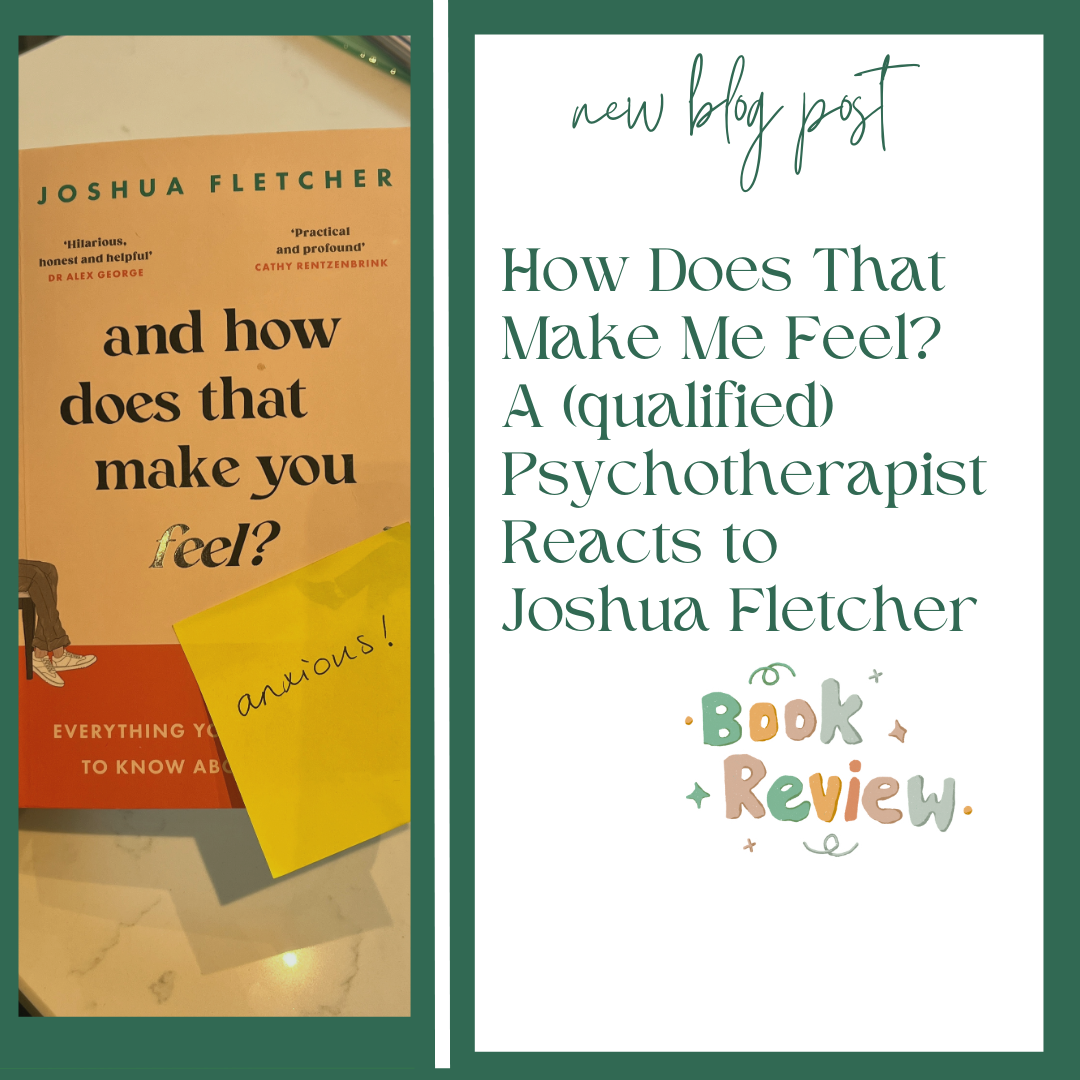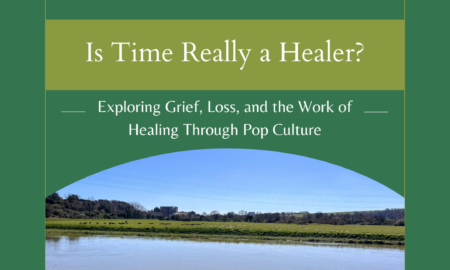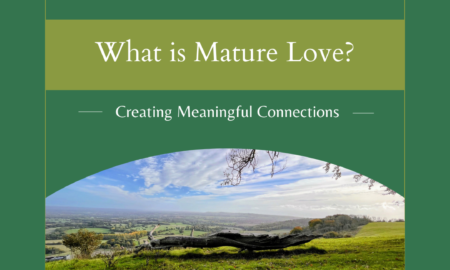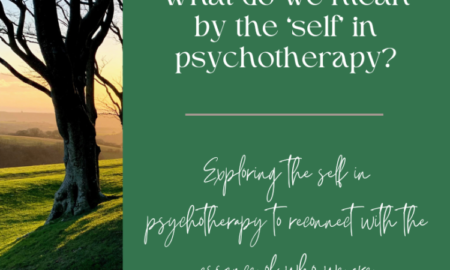How Does That Make Me Feel? A (qualified) Psychotherapist Reacts to Joshua Fletcher

When I picked up this book, I expected a playful, tongue-in-cheek take on therapy. After all, as psychotherapists, we’re familiar with lines like:
“Nothing can make you feel anything at all—we’re really talking about your response to the input.”
Right?
So, I was surprised when the introduction treated the titular phrase, “And how does that make you feel?” not with irony, but as a genuine question therapists might ask in the room. A more therapeutic formulation might be: “How did you feel when that happened?” or “What was your emotional response to that?” I hoped this contrast might be revisited later in the book—so I kept reading.
A Strong Start: Humanising the Therapist
Early on, Fletcher shares a universally relatable moment for therapists: when someone hears what we do and says, “So, I guess you’re psychoanalysing me now?”
He rightly points out that our training equips us to analyse, contextualise, and most importantly—be curious about people. And that curiosity, as he notes, comes from a place of compassion and positive intrigue, not judgement.
At this stage, I was enjoying the book. The tone was warm, accessible, and reflective of many experiences therapists will recognise.
Inner Worlds and Ego States
In the chapter “The Inner Voices of the Therapist,” Fletcher explores how therapists come to understand the different parts of their internal world. He names various inner voices—Analytical, Anxiety, Compassion, Critic, Intuition, Biology—and more, presenting them as distinct parts of the self.
This metaphor resonates with anyone familiar with Inner Parts work or Transactional Analysis (TA). In TA, we talk about ego states and how different aspects of the self become more present depending on context and emotion. Fletcher’s model offers a useful, non-pathologising way to understand internal conflict—both for therapists and for clients.
While I did find myself questioning the strength or dominance of certain voices (particularly in-session), I appreciated the metaphor’s overall accessibility and psychological utility.
Where It Unravelled: The Modality Wars
Unfortunately, my appreciation came to an abrupt halt with the chapter titled “The Modality Wars.” Fletcher opens with the following statement:
“The only difference between a psychotherapist and a counsellor is that a counsellor has five syllables and sounds way cooler. It’s why ‘psychotherapist’ is plastered all over my website, as opposed to peasanty ‘counsellor’. Either way, both can be called a therapist, so next time you see someone call themselves a psychotherapist, just know they’re as pretentious as me.”
This was jarring—and frankly, disappointing.
Was he seriously suggesting there’s no meaningful distinction between counsellors and psychotherapists?
While these titles aren’t legally protected in the UK, they do reflect substantial differences in training, depth of clinical experience, and professional accountability.
Counsellor vs. Psychotherapist: Why It Matters
To clarify: counselling qualifications can often be achieved through two-year (Level 4–6) programmes. Becoming a psychotherapist, however, typically involves four or more years of postgraduate (Level 7) training, along with rigorous clinical, academic, and ethical benchmarks. For example, in TA psychotherapy training, students are expected to complete:
- 4 years of postgraduate-level training
- 160+ hours of personal psychotherapy
- 100–150 hours of voluntary placement
- Regular supervision (often with both placement and TA-specific supervisors)
- Eligibility for private practice only after completing required placement hours
This constitutes the core training. For those pursuing the Certified Transactional Analyst (CTA) qualification—a recognised international standard—additional requirements include:
- 600 training hours (core training plus additional training)
- 750 clinical hours (supervised)
- 150 supervision hours (with a designated TA supervisor)
- 500 CPD hours, including:
- Personal therapy
- Conference/workshop attendance
- Mental health placements
- Peer-led learning
The process culminates in a 24,000-word dissertation, a major case study, and an oral exam (viva) before four international examiners. This includes discussion of client session recordings (with prior client consent) and theoretical application. It’s a demanding, ethically rooted process—anything but “pretentious.”
Respect, Clarity, and Public Trust
To be clear: I hold enormous respect for many counsellors. There are outstanding practitioners working at counselling level, many of whom go on to further their qualifications through CPD or psychotherapy training. Counselling is a valid and deeply valuable path.
However, conflating the roles—or worse, dismissing distinctions with flippant phrasing like “peasanty counsellor”—risks misleading the public and undermining years of professional dedication. When someone with a public platform downplays professional standards, it contributes to confusion and, potentially, mistrust among therapy clients.
This matters. Clients deserve clarity, and practitioners deserve to have their training and professional standards accurately represented.
Final Thoughts
I began this book with curiosity and optimism. Fletcher’s early chapters reflect genuine insight, emotional warmth, and a humanised picture of the therapist’s internal world. But by the midpoint, the tone shifted—and I found myself re-evaluating the professionalism and ethical considerations of the entire book.
It even raised questions for me about the anonymisation of case material. Regardless of how names or details are scrambled, there’s always the possibility that clients might recognise themselves in published accounts. This deserves caution, not casualness.
Fletcher had a real opportunity here: to use his platform to both demystify therapy and honour the standards that protect clients and guide professionals. Instead, his dismissal of meaningful professional distinctions—and his ironic self-deprecation—ultimately undermines what could have been a thoughtful contribution to the public understanding of therapy.
So how did this book make me feel?
Disappointed, professionally concerned—and, ironically, a little anxious.
If you’ve read the book, please do share your thoughts!
You may also be interested in...

Is Time Really a Healer?
Pop Culture and Loss I recently finished the Netflix series One Day. (Spoiler alert—if you haven’t seen it yet, you might want to pause here and come back once you…

What is Mature Love?
Creating Meaningful Connections Mature love, what is it? I’m not talking about being 80 years old and holding hands on a walk through the park here. I am talking about…

What Do We Mean by ‘The Self’ in Psychotherapy?
Understanding the Concept of the Self The concept of "the self" is central to psychotherapy, yet it can feel elusive and abstract. As therapists, we often talk about self-awareness, self-development,…

Your Life Story
Your Life Story One of the core theories of Transactional Analysis is the notion of a life script. Put simply, a life script is a pre-conscious life plan that determines…

Improve Your Mental Strength
Ever wondered why some people seem to bounce back effortlessly from life's curveballs while others struggle to regain their footing? The secret lies in mental strength – that intangible power…

The Early Clues To Adult Personality
As new parents we strive to see early clues in our baby's temperament to see if we're able to guess what they may be like as adults. But how far…
Ready to Make a Change? Book an Initial Consultation Today
If you have any questions at all about therapy or would like to make an appointment, get in touch. I will usually be able to respond to you within 24 hours.
